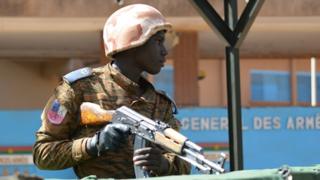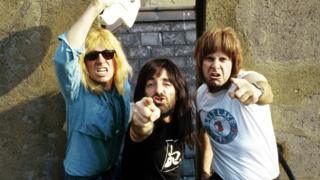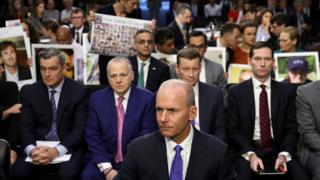 Image copyright
Image copyright
Getty Images
Dennis Muilenburg is being quizzed over the deadly 737 Max 8 crashes
US lawmakers have accused Boeing of engaging in a “pattern of deliberate concealment” as it sought approval for its 737 Max 8 plane to fly.
The accusation came as Boeing chief executive Dennis Muilenburg was quizzed by the Senate Commerce Committee.
Senators said they had serious concerns that Boeing put profits over safety as it rushed to get clearance.
Two deadly 737 Max 8 crashes killed a total of 346 people. Mr Muilenburg admitted the firm had made “mistakes”.
“We have learned from both accidents and identified changes that need to be made,” he said.
In October last year, a Boeing 737 Max operated by Lion Air crashed, killing all 189 people on board.
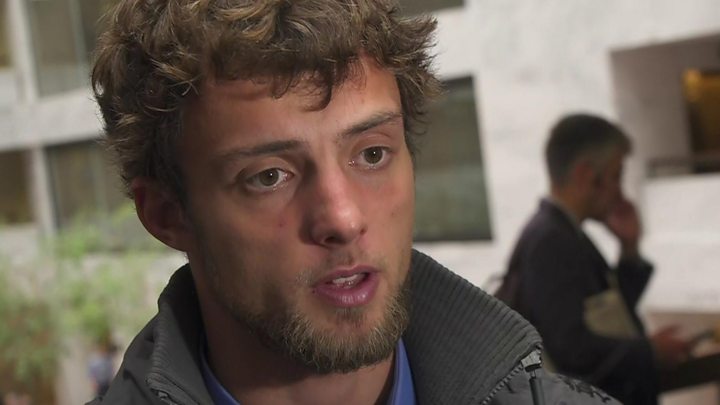
Media playback is unsupported on your device
Five months later an Ethiopian Airlines plane crashed, killing 157, after which the entire 737 Max fleet was grounded.
‘Casualness and flippancy’
Lawmakers accused Boeing of being aware of problems in the automated control system in the 737 Max 8, known as MCAS, which has been identified as a factor in both accidents.
Senator Roger Wicker said messages between Boeing staff during certification that raised issues in the MCAS test system betrayed “a disturbing level of casualness and flippancy”.
Senator Richard Blumenthal said Boeing had rushed the approval process and engaged in a “pattern of deliberate concealment”.
He suggested that pilots had been misled and Boeing had, in effect, designed a ‘flying coffin’.
Boeing provided the messages to the committee ahead of the testimony.
Mr Muilenburg said he had learned the details of the exchange recently could not elaborate on the communication.
Image copyright
Reuters
Family members hold photographs of Boeing 737 Max crash victims
Families of people who died in the crash, many of whom attended the hearing, told the BBC that they felt Mr Muilenburg was evasive and should resign.
“I want him to say unequivocally that he takes responsibility for the deaths of 346 people because the crashes were preventable,” said Paul Njoroge, who lost five family members in the Ethiopia crash.
Adnaan Stumo, whose sister Samya died in the Ethiopian Airlines crash, said Mr Muilenburg should step down “and go to jail”.
Senators also criticised the regulatory process, saying there was excessive “cosiness” between the firm and safety officials at the Federal Aviation Administration (FAA).
Mr Blumenthal described the US certification process as “absolutely broken”.
Mr Muilenburg said the firm supported “strong oversight” but declined to support increasing the authority of the FAA, which has been criticised for delegating too much of its oversight to company officials.
Mr Muilenburg said safety is enhanced by tapping industry technical expertise.
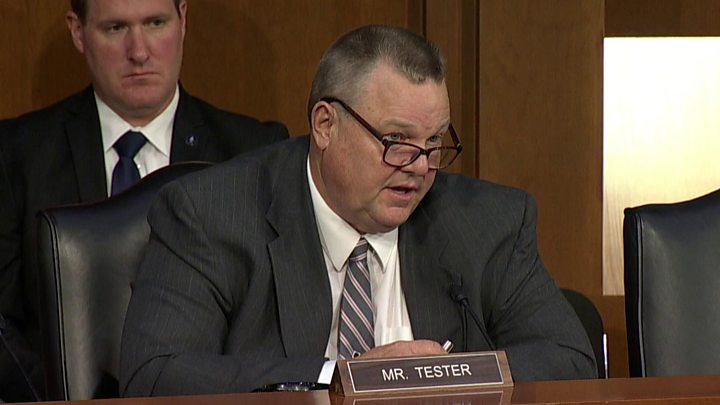
Media playback is unsupported on your device
The company also disputed the characterisation of its relationship with regulators as “cosy”.
“It’s not a cosy relationship. It’s a professional relationship,” said Boeing’s chief engineer John Hamilton.
Since the grounding of the 737 Max fleet in March, Boeing has said it is fixing software and has overhauled its review procedures.
But senators said the continued delays in re-certification cast serious doubt on the initial approval.
They faulted Boeing for not sharing more information about the MCAS system with regulators or pilots, despite its power to control the plane’s flight path.
Senator Maria Cantwell said the crashes should spur broader scrutiny of automated systems, which are becoming more common – not just in airplanes but also in cars and other forms of transportation.
“This is the issue du jour,” she said.











